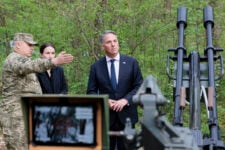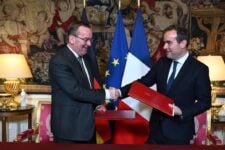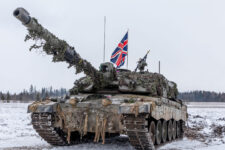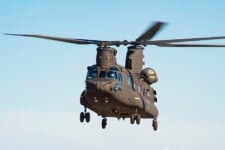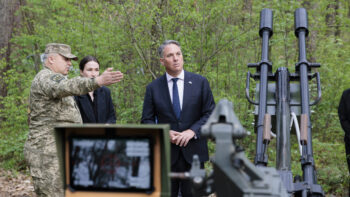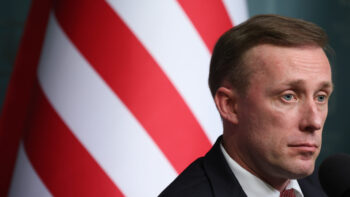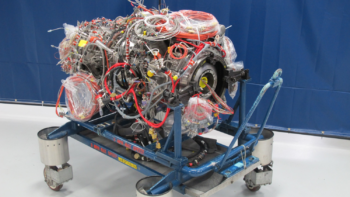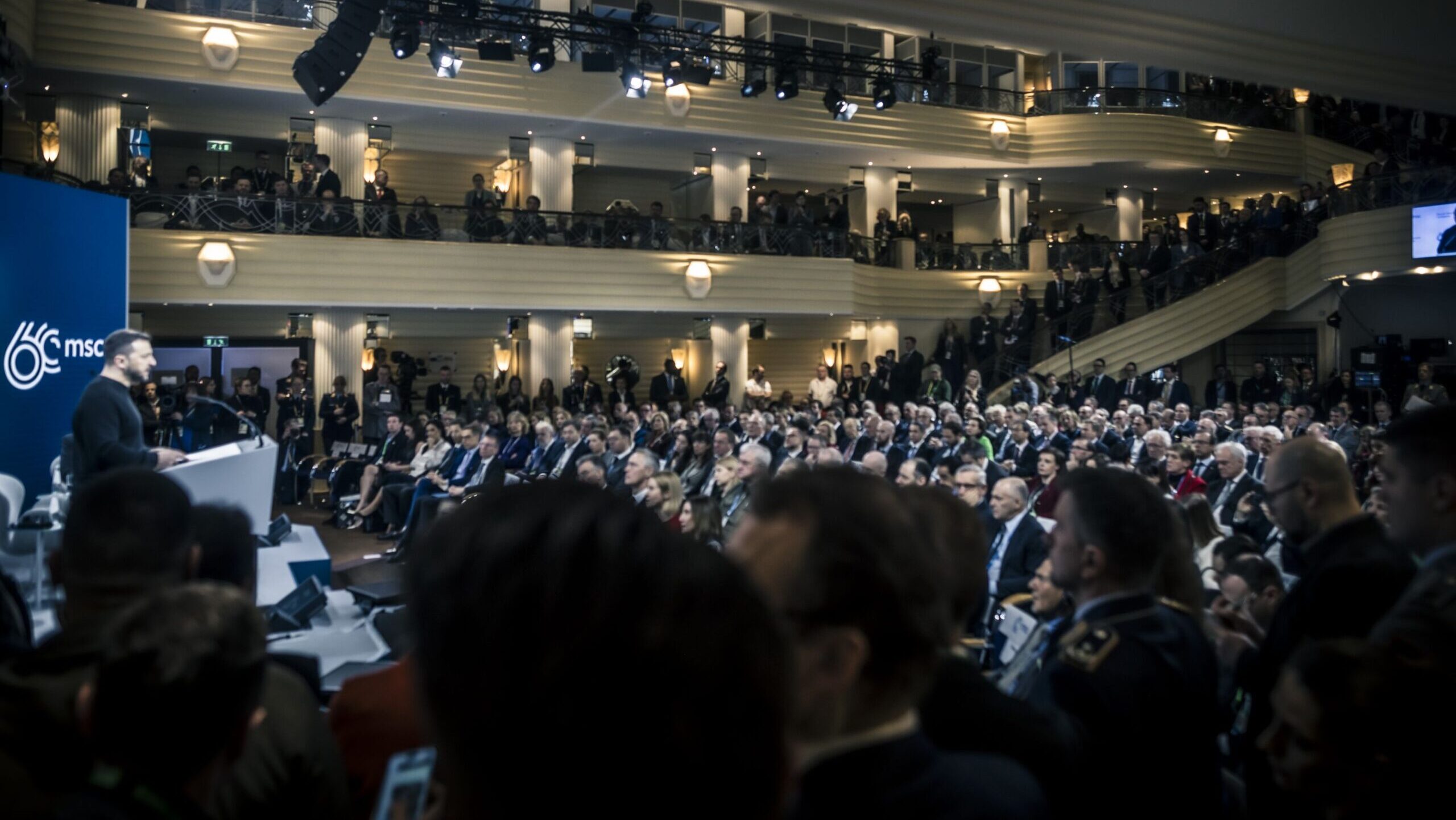
Ukraine President Volodymyr Zelensky speaks before world leaders and diplomats at the Munich Security Conference (MSC media library)
MUNICH — In a remarkable show of political peace making, Ukraine President Volodymyr Zelensky has offered US presidential candidate Donald Trump a visit to Ukraine’s frontline, despite Trump’s recent declaration he would “encourage” Russia to attack NATO nations that are not contributing enough funding to alliance spending.
“If Mr. Trump will come, I am ready, even to go with him to the frontline,” said Zelensky in an address to the Munich Security conference today. The Ukrainian leader added that he has previously invited Trump to visit Kyiv.
Zelensky’s outreach is the clearest sign yet that he wants to try and warm relations with the Republican presidential hopeful, at a time when Europe is starting to grapple with the reality that the Eurosceptic former president could return to office — this time, without the restraints of more traditional Washington voices like former Secretary of Defense Jim Mattis.
Last week, Trump sent shockwaves throughout the NATO alliance when he told a crowd that he would tell nations that if they are not meeting at least the 2 percent GDP on defense spending target, “I would not protect you. In fact, I would encourage them [Russia] to do whatever the hell they want. You gotta pay. You gotta pay your bills.”
That direct shot at NATO’s core Article 5 principle, combined with House Republicans holding up a Senate-passed funding supplemental that includes $60 billion for Ukraine-related aid has raised a sense here that Republicans are ready to abandon Ukraine entirely. But Zelensky stressed the importance of working with the party, and said he was “really thankful for bipartisan support” from Washington.
“We are very open [with both Republicans and Democrats] and we always want both of them to be involved” and access “real information,” he explained.
OP ED: American politics could derail NATO’s momentum – unless leaders prepare now.
In what could only be taken as a sign of growing frustration with Trump and US lawmakers however, Zelensky appeared to ask if Europe should sideline Washington from future collective defense decision making.
“Perhaps Europe is facing times when the question of invoking Article 5 of [the] NATO Treaty will not be a question for Washington at all, but rather for European capitals,” he said, without elaborating on how that would work, as all NATO nations need to agree to invoke Article 5.
German Chancellor Olaf Scholz warned of dangers linked to disagreements on Article 5 playing into the hands of Russia.
“Any relativization of NATO’s mutual defense guarantee will only benefit those who just like Putin want to weaken us,” he said here.
European Nations Increase Kyiv Aid
The Munich forum, as well as the political holdup in Washington, arrives at a time when Ukraine is facing an acute ammunition crisis and losing ground to Russia.
Zelensky confirmed an order from Gen. Oleksandr Syrsky, Ukraine’s newly-installed top military commander, for his troops to be withdrawn from fighting in Avdiivka, in Eastern Ukraine, pending an imminent encirclement. Russian control of Avdiivka, is its first major territorial gain since May of 2023, according to the New York Times.
“[This] was a professional decision to save as many Ukrainian lives” as possible, Zelensky said.
“Saving the lives of our people, that’s our main objective” he explained. “We’re saving soldiers, because that’s a defense. We’re very grateful to our partners for any weapons but clearly the weapons can only help to bring back justice and peace of the territory of Ukraine.”
New commitments on weapons have been significant in recent days, with Germany announcing a security pact with Ukraine on Tuesday. Funding of around €1.1 billion ($1.2 billion) for air defense systems and ground vehicles is tied to the bilateral agreement.
Berlin also remains under significant political pressure to send much needed Taurus cruise missiles to Kyiv, but when asked today about why he had so far refused to do so, Scholz repeatedly dodged the question.
The decision not to supply Taurus is out of step with Britain and France supplying Ukraine with MBDA Storm Shadow and SCALP cruise missiles, respectively. Those long-range weapons allow Ukraine to strike deeper into Russian-controlled territory to take out vulnerable depots, command centers or vehicles.
Scholz has previously aired a fear around an “escalation of war” if Taurus was ever used to strike the Kerch bridge linking Russia with occupied Crimea. The destruction of the landmark is held up by Ukraine as a strategic priority, and experts agree Taurus would have that range.
Former UK defense secretary Ben Wallace urged Germany to send the weapon in a social media post on Friday, in part as a reaction to the death of Russian opposition leader Alexey Navalny.
The cruise missile, integrated with a MEPHISTO “high penetration” warhead, offers a range of more than 500 kilometers and is typically employed on German Tornado IDS (interdictor/strike), Spanish EF-18 and Korean F-15K fighter jets, according to MBDA company literature [PDF].
In all, Scholz said that Germany has “provided and planned” military aid funding for Ukraine valued at €28 billion ($30 billion).
“This year, we have almost doubled our military assistance to more than €7 billion ($7.5 billion), then there are pledges of €6 billion ($6.4 billion) for the next few years,” he added.
Germany’s latest funding package was soon followed by France and Ukraine signing a 10-year security pact that commits Paris to providing Kyiv with €3 billion ($3.2 billion) in military aid.
Zelensky also took to X, (formerly Twitter) today to say that he is working on a bilateral agreement with Prime Minister of Denmark, Mette Frederiksen, which will see Copenhagen involved in the joint production of drones.
Australia tops up Ukraine military aid with $100M
Australia has already supplied Ukraine with 120 Bushmaster vehicles, six 155mm howitzers, 56 M113 armored vehicles, 14 special operations vehicles and its signature cardboard drones.
